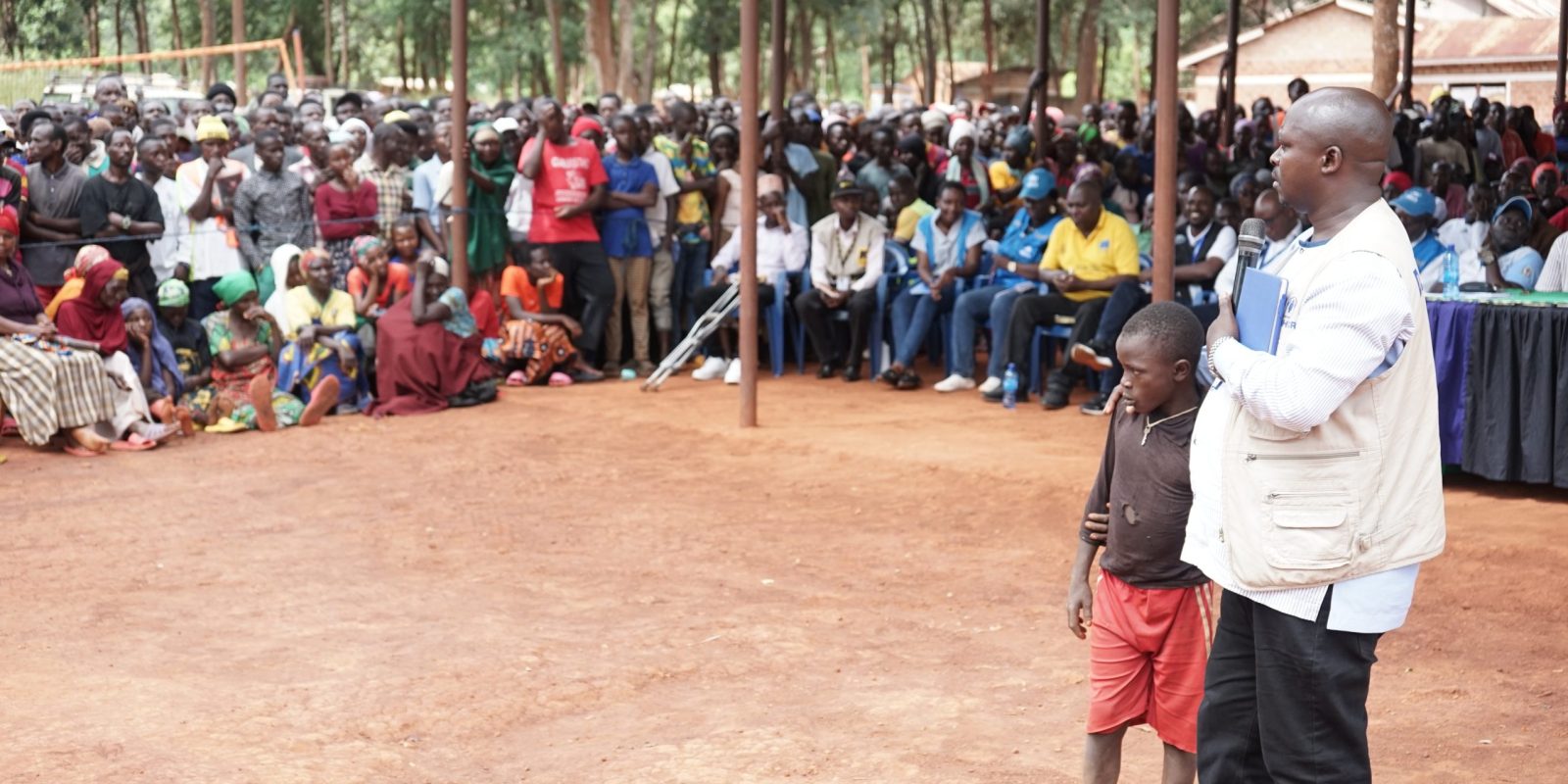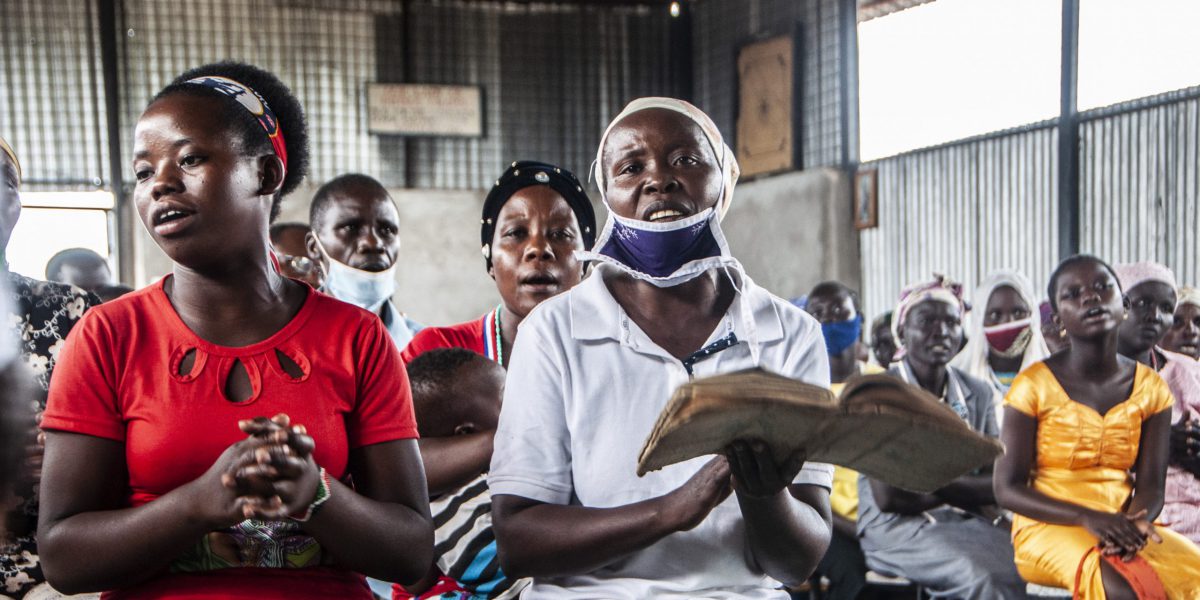
Who We Are: Our Identity
The Jesuits (Society of Jesus) are a religious order of the Roman Catholic Church founded in 1540. Jesuits from around the world are engaged in evangelization, interreligious and ecumenical dialogue, education, research, and ministry, especially to those on the margins. Since its early days, education of young people has been a priority. Today, Jesuits operate or sponsor 3,730 schools throughout the world, caring for 2.5 million students in places ranging from Egypt and Kenya to Nepal and Belize. In all their works, Jesuits and their collaborators seek to care for the whole person—mind, body, and spirit–and seeks to develop compassionate and creative leaders, committed to justice and social transformation.
Fr. Pedro Arrupe, a beloved Superior General of the Jesuits (from 1965 to 1983), said our common Mission is to form “men and women for others, men and women who will not live for themselves… men and women who cannot even conceive of love of God which does not include love for the least of their neighbors; men and women completely convinced that love of God which does not issue in justice for others is a farce.”
Inspired by this spirit, Arrupe founded the Jesuit Refugee Service (JRS) on November 14th, 1980 in response to the plight of Vietnamese refugees. Fleeing their war-ravaged homeland, hundreds of thousands of Vietnamese set out on small boats across the South China Sea only to face threats of pirates, storms, dehydration, and hunger. Many did not survive. Others found themselves confined in camps of first asylum in Southeast Asia, awaiting resettlement elsewhere.
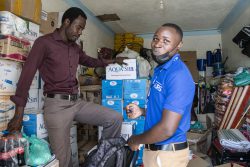
Fr. Arrupe sought “to bring at least some relief to such a tragic situation” by mobilizing the global resources of the Society of Jesus. It was, he said, “a challenge to the Society we cannot ignore.” Over the next decades, JRS would expand and consolidate its mission, responding to civil strife in Central and Latin America, Southeastern Europe, and throughout Africa. JRS has long outgrown its humble beginnings. Officially registered as a foundation of the Vatican City State on March 19th, 2000, JRS operates today in 58 countries, serving over a million and a half refugees and other forcibly displaced persons in conflict zones, refugee camps, cities, and detention centers. In Eastern Africa Region, JRS operates in 6 countries (Kenya, Uganda, South Sudan, Ethiopia, Tanzania & Burundi) serving more than 335,700 forcibly displaced people.
What We Do: Our Mission
Today, secondary and post-secondary education and livelihood initiatives promote gender equity; while other programs offer care and inclusive education for children with disabilities, psychosocial support, health care, legal assistance, protection, and humanitarian relief. Although JRS is inspired by the Jesuit spiritual tradition and Catholic social teaching, it serves refugees and forcibly displaced of all faiths. United in the compassion that marks all great religious traditions as well as secular commitments to dignity and human rights, members of the JRS family themselves come from many different religious traditions and denominations, serving the forcibly displaced without discrimination due to faith, gender, race, ethnicity, or disability. As an implementing partner of UNHCR, JRS embraces opportunities to collaborate with other NGOs, both faith-based and secular.
In all its programs, JRS promotes social reconciliation through its threefold mission of accompanying refugees and other forcibly displaced persons, serving them, and advocating for justice on their behalf that they may heal, learn, and determine their own future. And the need for such a mission has never been greater. United Nations Refugee Agency (UNHCR) reports that current levels of displacement are the highest ever recorded. By the end of 2021, an unprecedented 89.3 million people were forced from their homes, including over 36.2 million refugees, asylum seekers, and others displaced across borders, c. 40 percent of whom are under the age of 18. Today, the number of forcibly displaced exceeds 100 million, 60 percent of whom are internally displaced. Already victims of ethnic cleansing, mass expulsion, and environmental degradation wrought by climate change, the majority of refugees, 74%, subsist in protracted situations like Kakuma where basic human rights remain unfulfilled after years in exile.
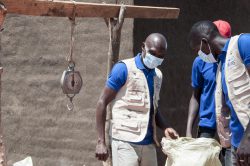
Accompaniment, recognizes the innate, inviolable dignity of “the most vulnerable and excluded persons in our midst.” Accompaniment is rooted in compassion, literally a suffering-with our sisters and brothers. In Kakuma and in our mission to urban refugees in Nairobi we thus have an “open door” policy for all who come to us in need.
Service proceeds from such recognition as we accompany those most vulnerable and whose needs are not otherwise addressed, e.g., children with disability and girl children. Through our many programs of MHPSS, livelihood, education, etc., we seek to restore victims of violence, ethnic strife, displacement and discrimination to community.
Finally, Advocacy not only looks to the immediate legal redress of victims, but seeks to transform the systemic causes of victimization, i.e., the “economic, political, and social structures that generate injustice.”
Understood thus, the pillars of our mission are, at once, pillars of Reconciliation (mercy, justice, truth, and peace). For genuine reconciliation presumes recognition of dignity at the heart of accompaniment; specific redress of victims; and systemic redress of the causes of victimization.
Values Inspiring Our Mission and Identity
We believe that journeying with refugees is the most important way for us to express our solidarity with them and our concern for their wellbeing. In a world where refugees are more than ever in need of welcome, protection, opportunities, and justice, and yet are increasingly rejected, demonized, and denied their fundamental human rights, JRS offers accompaniment to refugees as a sign of hope and a way towards personal healing and reconciliation. In even the most desperate of situations, we remain with refugees, assuring them in our service and advocacy that the world has not forgotten them, and that they are not alone, that their voice is heard.
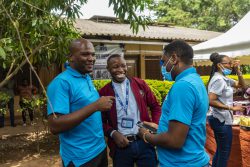
Our accompaniment, service, and advocacy, integrated in our mission of reconciliation, reflect fundamental values that are catholic: both in the original sense of “catholic” meaning universal, and in the sense of being borne by a distinctive religious “Catholic” tradition.
Dignity-in-Solidarity
At the heart of our JRS mission is belief in the innate dignity or the sacredness of life. Scripture teaches us that we are created in the very image of God (Gen 1: 27): we are gifted with freedom and intelligence, so we can choose, not only what we do, but who we become in relation to God and to others. Christians, like Jews, believe in God’s Creation of a “thou” to hear God’s word, and Moslems believe that we are God’s “viceregents” on earth. Indeed, we may speak of an “overlapping consensus”[1] of sacred and secular traditions affirming what the Universal Declaration of Human Rights calls our “common faith” in dignity and human rights.
Dignity implies that we have worth and not price: dignity does not change like desires, interests, or profits. Dignity is permanent, inalienable, and irreplaceable; no one ever ceases to matter! We cannot “give” others dignity; nor can their dignity ever be lost or sacrificed, even where it is systemically denied or violated, e.g., by forced displacement, racism, or gender or ethnic bias. It follows, then, that we are always worthy of respect whatever roles we play. Dignity does not depend upon our social status, religion, gender, class, race, ethnicity, or orientation, etc. Moreover, to say that weall have such innate worth is to say we are equally valuable: No one can ever take your place.[2]
Whether we think of dignity in religious or secular terms, dignity is the basis of moral solidarity. Our freedom is “bonded” by the very value we place upon one another, so that every person is equally worthy of respect and consideration. In a sense, we may say that the human community is present in every person.[3]
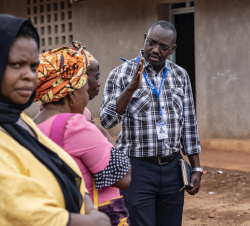
Human Rights and Duties
Today, we translate the religious demands of justice or covenant fidelity in terms of the modern language of human rights and correlative duties. Respecting persons as agents implies respecting the conditions of their exercising agency. These include not only basic civil-political liberties; but basic rights to security—freedom from violence, coercion, or sexual assault; and social, economic, and cultural rights, e.g., rights to adequate nutrition, health care, shelter, education, etc.
Such basic rights, in turn, impose duties of both forbearance (what we are free from) and performance (protecting and providing for the fulfilment of all basic, interdependent rights). “Positive” duties of protection and provision, moreover, are borne only by individuals but by social structures and institutions: a girl child’s right to basic education will require not only schooling but accessible schools and laws prohibiting gender discrimination. Basic rights and duties “hang together” as we do justice. Threatening any basic right, just because it is basic and thus necessary for realizing our agency, implicitly threatens all such rights.
Justice and the Common Good
Honoring the basic human rights of all persons defines the moral minimum of distributive justice (what is due each person); while fulfilling the duties or responsibilities correlative to such rights in social justice specifies our contribution to the common good: “the good of all people and of the whole person.”
Further norms guide us as we move from general principles (dignity-in-solidarity, human rights and duties, justice and the common good) to their concrete application. We exercise individual liberty in the context of solidarity, so that basic rights of effective participation (those most affected should have the greater say) imply subsidiarity in realizing the political common good.[4] Subsidiarity respects the role of mediating institutions that promote effective and inclusive participation in civil society: the vital role played by families; civil associations such as churches, synagogues, mosques, and trade unions; nongovernmental organizations (both local and international); and transnational institutions such as the United Nations Refugee Agency.
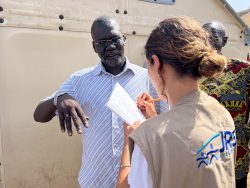
The Preferential Option for the Poor
Liberties of effective participation and subsidiarity let us share in the political common good. Yet in a world marred by violence and inequity, it is not ethical integration but exclusion that prevails. In doing justice, then, we must struggle to restore the common good by our option for the poor or systematically vulnerable. For just as a parent cares differently for a sick or well child, so impartial regard for my neighbor’s rights justifies preferential attention for my neighbor in distress. Our entitlement to equal respect or consideration justifies preferential treatment for those whose basic rights are most threatened[5]—in Camus’s phrase, our taking “the victim’s side.”[6]
Restoring the civic common good thus justifies our legislative preference for the least favored in society: poor migrant women and their families, minorities suffering ethnic or racial bias, the disabled, etc. Securing their basic rights, including their rights to effective, civic participation, marks the legitimacy of our political institutions. In times of systemic deprivation, violence, and displacement, we must thus ask: 1) Who are the most vulnerable in our midst? Who is missing from the table of deliberation, whose voice has been silenced by the dominant powers? 2) What are the best means of specific redress, i.e., of securing the special rights of victims, here and now? (Forced migrants, for instance, possess special rights, such as a right to asylum, precisely because their general rights are denied. 3) What are the best means of general redress, i.e., of securing the basic rights of the poor and marginalized in our particular cultural contexts? Conceived thus, the option for the poor becomes our ethical lens—the way in which, in a religiously pluralist society, we recognize injustice, and implement a rights regime.
Hope, Hospitality, and Compassion
In a world that can seem so bleak and desperate, our common faith in dignity and human rights is nurtured by a living hope. Our religious traditions affirm the sacredness of every person as irreducibly valuable whatever suffering befalls them—a lesson that refugees often teach us in their refusal to despair, in their care for their children. Our Scriptures, too, remind us that love of neighbor in covenant fidelity will be proven by our hospitality for the widow, orphan, and migrant or refugee—the most vulnerable among us. Hospitality, then, is not merely an exercise of “charity,” but a deep expression of love at the “frontiers of humanity”: of compassion that unlike mere pity enters into the suffering of a sister or brother. Compassion is a “suffering-with”: “doing justice” and “loving tenderly” as we “walk humbly with our God” and one another in our journey towards what the prophet Jeremiah called “a future with hope” (Jer. 29:11).
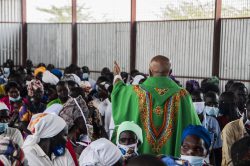
Discernment
JRS is thus shares our common humanitarian values. But unlike other humanitarian NGOs, JRS was not founded for a specific purpose, e.g., livelihood, education, health care, etc. Rather, as at its inception, JRS seeks to respond to the suffering and injustices suffered by the most vulnerable in our midst. How we respond—our decision-making—thus turns on our personal and collective discernment: How can we accompany the most vulnerable in our midst not being served or served adequately? How can we, with our resources and personnel, best serve them as agents of reconciliation–how do we take the victim’s side? And can we best advocate on their behalf, redressing the causes of victimization and ensuring their effective participation in decisions affecting them?
Finally, as the JRS family, we accompany one another in our journeys as we journey with our sisters and brothers. Much has changed since Fr Pedro Arrupe founded JRS, but our mission to accompany, serve, and advocate for refugees and displaced people remains the same: “Home is where we all begin, and what we want all people to find.”
For further background information and JRS most recent strategic plan, please see:
[1] John Rawls, Political Liberalism (New York: Colombia University Press, 2005), 133-73.
[2] Gene Outka, Agape: An Ethical Analysis (New Haven: Yale University Press, 1972), 12-13.
[3] See Jean-François Lyotard, “The Other’s Rights,” in The Politics of Human Rights, ed. Obrad Savić (London: Verso, 1999), 181-88, at 181. Cf. Immanuel Kant, The Metaphysical Elements of Justice, trans. John Ladd (Indianapolis: Bobbs-Merrill, 1965), 34, 52.
[4] For the implications of “effective participation,” see Henry Shue’s analysis in Basic Rights: Subsistence, Affluence, and U.S. Foreign Policy, second edition (Princeton, NJ: Princeton University Press, 1996), 71-78.
[5] Gene Outka, Agape: An Ethical Analysis (New Haven: Yale University Press, 1972), 20. Cf. Ronald Dworkin, Taking Rights Seriously(Cambridge, MA: Harvard University, 1978), 227.
[6] Albert Camus, The Plague, trans. Stuart Gilbert (New York: Alfred A. Knopf, 1960), 230.

